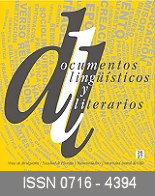El ‘decir’ de la muerte en el Chile colonial
The ‘saying’ of death in colonial Chile
Abstract
The experience of death is, perhaps, for the human being, one of those that most shakes his vital and ideological structure. From bodily decay to the basic questions of existential questioning, a path is traversed that passes through the longing for transcendence, for eternity. As objective materiality is, by essence, finite, it is not possible to aspire to the perpetuation of the body, although many legends and myths from the earliest antiquity have told us of such wonders, and many are the efforts of science and of technology - our contemporary legends - to prolong, and perpetuate the degradable. Therefore, only the experience of the discourse of death remains, preparing the soul and the body for the final path.
In this work, an analysis of Chilean colonial wills is presented, from the philological perspective, not only framing the context of production of this documentary typology, but also from the conformation of American Spanish, as part of the linguistic and social identity of the Creole society, particularly of this marginal Hispanic community, from the mid-16th century to the late 18th century.





